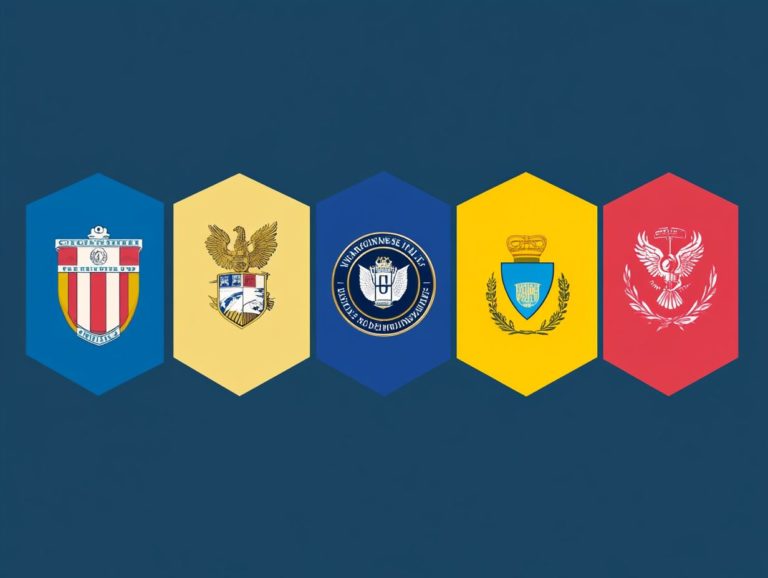Why Accreditation Matters for Online Degrees
In today s digital landscape, online degrees provide you with unparalleled flexibility and convenience, catering to learners all around the globe.
However, not all online programs are created equal. It’s essential for you to grasp the significance of accreditation it plays a critical role in ensuring that your educational investment yields meaningful returns.
This article delves into what accreditation truly means and its importance within the realm of online degrees. You ll also discover the myriad benefits of selecting accredited programs.
Are you ready to take control of your education journey? Let s navigate this landscape together!
Contents
- Key Takeaways:
- The Importance of Accreditation
- Benefits of Accredited Online Degrees
- Potential Risks of Non-Accredited Degrees
- How to Verify Accreditation of an Online Degree Program
- Frequently Asked Questions
- What is accreditation and why does it matter for online degrees?
- Why should I care about accreditation for online degrees?
- How can I find out if an online degree program is accredited?
- What are the consequences of enrolling in a non-accredited online degree program?
- Are all accredited online degree programs created equal?
- Can I transfer credits from an accredited online degree program to a traditional university?
Key Takeaways:

Accreditation is essential for ensuring the quality and credibility of online degree programs.
Accredited online degrees are widely recognized and respected by employers, allowing for better job opportunities and career advancement.
Non-accredited degrees can present risks, such as limited job prospects and difficulty transferring credits or pursuing higher education.
What are Online Degrees?
Online degrees embody a modern approach to higher education, allowing you to work towards your educational goals from virtually anywhere in the world.
These programs span a wide range of fields and offer flexible learning options that fit seamlessly into your busy life.
Institutions like Touro University Worldwide provide accredited online degree programs recognized internationally. This ensures you receive quality education and a pathway to academic success.
Many of these programs align with educational standards established by organizations such as the University Grants Commission (UGC).
As this educational landscape evolves, it s increasingly appealing to both working professionals and traditional students who value convenience and adaptability.
The structure of these programs includes interactive coursework, virtual classrooms, and ample opportunities to collaborate with peers and instructors.
The surge in online education s popularity in recent years can be attributed to its compatibility with hectic lifestyles and the growing acceptance of digital qualifications in the job market.
Notable institutions are continually innovating and enhancing their offerings, making accredited online degrees a practical choice for anyone eager to advance their careers.
The Importance of Accreditation
University accreditation is an essential benchmark of educational quality. It ensures that institutions uphold the rigorous standards established by recognized accrediting bodies.
Accreditation confirms the credibility of colleges and universities, ensuring their programs whether online or on-campus comply with quality assurance protocols that serve both students and employers.
It also plays a crucial role in maintaining educational standards, guaranteeing that graduates are well-equipped for the workforce.
Thus, it’s a vital component of the higher education landscape that you should carefully consider.
What is Accreditation and Why Does it Matter?
Accreditation is a formal recognition process that evaluates educational institutions and their programs against established standards of quality and effectiveness.
This process is essential, as it assures you that you’re receiving a quality education and enhances your career opportunities after graduation.
Employers often prefer graduates from accredited programs, recognizing that they’ve undergone a rigorous educational journey that equips them with the necessary skills and knowledge for their respective fields.
There are several types of accreditation, including institutional and programmatic, each playing a vital role in shaping the educational landscape.
Institutional accreditation assesses the entire institution, ensuring it meets a broad range of criteria. In contrast, programmatic accreditation focuses on specific programs, such as engineering or nursing.
Understanding the nuances of these different types can significantly influence your choices and impact your prospects as you enter the job market.
Alumni from accredited institutions frequently report greater satisfaction in their professional journeys. Employers rely on accreditation as a benchmark for hiring, underscoring its importance in fostering a reliable workforce.
Explore accredited programs today and invest in your future!
Benefits of Accredited Online Degrees

Accredited online degrees offer many benefits that enhance your learning experience and improve your job opportunities. These advantages include access to federal financial aid, which can significantly reduce the cost of your education.
You also gain enhanced networking opportunities by being part of recognized programs. Programmatic accreditation means your program meets industry standards, solidifying the value of your accredited online degree in a competitive job market.
Recognized and Respected Credentials
Graduates from accredited institutions earn credentials that are recognized and respected, giving them an edge in the job market. These credentials reflect a commitment to quality education and enhance the credibility of degree holders.
Notable figures like Shaquille O’Neal highlight the importance of education and accreditation, showing how these qualifications can unlock diverse career opportunities and professional connections.
In today s globalized economy, the demand for skilled professionals with reputable educational backgrounds is high. Many successful individuals have leveraged their degrees to thrive in their fields and embark on various ventures, including business initiatives and philanthropic efforts.
When influential figures endorse accredited institutions, they boost your chances of success! Employers tend to trust candidates with verified credentials more, leading to better internship prospects, mentoring opportunities, and career advancements that can significantly shape your professional journey.
Access to Financial Aid and Transfer Credits
One key advantage of accredited online degree programs is access to financial aid, including federal options that can ease tuition costs. You can also benefit from transfer credits recognized by other accredited institutions, helping you progress in your educational journey.
This flexibility in financing and credit transferability is essential for anyone aiming for academic success. Financial aid comes in various forms such as grants that don t require repayment and scholarships based on merit or need allowing you to maximize your educational investments.
Navigating these opportunities can lead to substantial savings and help reduce student debt. Transfer credits play a vital role in ensuring a smooth transition between colleges.
If you switch institutions or pursue a different program, having previously earned credits accepted at your new school prevents delays in graduation and creates an efficient path to degree completion.
With a solid understanding of the financial landscape and transfer policies, you can plan your academic journey with confidence.
Potential Risks of Non-Accredited Degrees
Pursuing a non-accredited degree can present significant challenges, especially regarding job opportunities after graduation. Many employers prefer candidates with accredited degrees, as these programs have undergone strict evaluations to ensure quality and relevance.
This discrepancy can hinder your journey toward academic success and career growth. Therefore, it’s crucial to understand the implications of choosing non-accredited educational paths.
Ready to take the next step? Explore accredited programs today to unlock your full potential!
Limited Job Opportunities and Career Advancement

Earning a non-accredited degree can limit your job opportunities. Many employers prefer candidates with accredited qualifications, which can hinder your career growth.
You may find yourself at a disadvantage in the job market. Understanding accreditation is vital for anyone seeking meaningful employment.
Without accreditation, employers might question the quality of your education. This can affect your chances of getting hired and advancing in your career.
As industries increasingly value accredited credentials, those with non-accredited degrees may encounter significant hurdles in achieving their career aspirations and financial stability.
Difficulty Transferring Credits or Pursuing Higher Education
Graduates from non-accredited programs face challenges when transferring credits to accredited schools. This is due to the lack of recognized educational standards.
These challenges can lead to higher tuition costs and longer timeframes to achieve your educational goals. The rejection of non-accredited credits can diminish your motivation.
Recognizing how a non-accredited credential can restrict future opportunities is essential. Prioritizing accredited programs from the start is crucial for your success.
How to Verify Accreditation of an Online Degree Program
Check the accreditation of your online degree program to ensure quality education. Look at reputable accrediting bodies and the Department of Education s list of accredited institutions.
By conducting thorough research, you can protect yourself from enrolling in non-accredited options that could jeopardize your academic and professional aspirations.
Resources and Tips for Researching Accreditation Status
Researching the accreditation status of an online degree program becomes straightforward when you utilize valuable resources. Start by visiting the Department of Education’s website, where you’ll find a list of accredited institutions and programs.
Also, check the official sites of accrediting bodies, such as the Council on Social Work Education or the Western Association of Schools and Colleges, to confirm the status of specific programs.
Exploring platforms like the Council for Higher Education Accreditation (CHEA) can further help you understand the landscape of recognized institutions. Seeking out reviews from former students, often found on forums or social media groups, can provide invaluable insights.
Thorough research not only verifies accreditation but also helps you assess the quality and reputation of the programs you re considering. This ensures that you choose educational paths that align with your career goals.
Frequently Asked Questions

What is accreditation and why does it matter for online degrees?
Accreditation is a process where an independent organization evaluates and recognizes a school or program to ensure it meets high standards of quality. It matters for online degrees because choosing an accredited online program guarantees that the education provided is legitimate and meets industry standards.
Why should I care about accreditation for online degrees?
Accreditation is crucial for your future. Without it, your degree might not be recognized, which can seriously limit your career choices.
How can I find out if an online degree program is accredited?
Check the website of the organization that verifies school standards. You can also search the U.S. Department of Education’s Database of Accredited Postsecondary Institutions and Programs.
What are the consequences of enrolling in a non-accredited online degree program?
A non-accredited program can leave you with a degree that employers don t recognize. This can restrict your job options and waste time and money.
Are all accredited online degree programs created equal?
No, they are not all the same. Accreditation means certain standards are met, but you should still research the quality and reputation of any program you consider.
Can I transfer credits from an accredited online degree program to a traditional university?
Whether you can transfer credits depends on the traditional university s policies. Generally, accredited programs have a better chance of being accepted.






